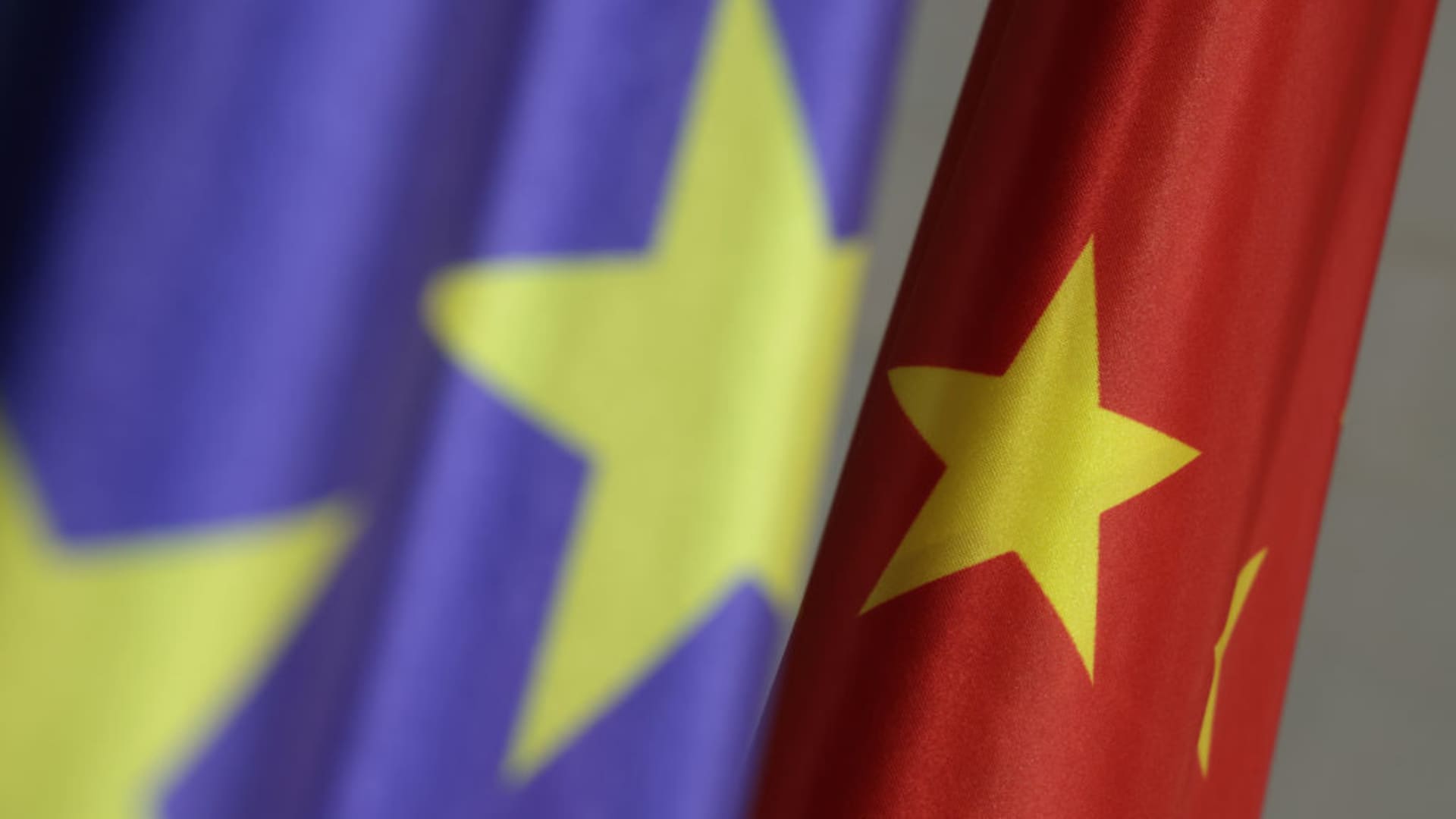The flags of the European Union (L) and China stand side by side at the Chancellery on June 20, 2023 in Berlin, Germany.
Sean Gallup | Getty Images News | Getty Images
China and the European Union are unlikely to become close allies quickly, analysts say, even as U.S. President Donald Trump’s tariffs sour relations between the world’s largest economy and both its transatlantic allies and Beijing.
“I don’t see the EU and China uniting against the US,” Max Bergmann, director of the Europe, Russia, and Eurasia Program at the Center for Strategic and International Studies (CSIS) said.
On a geopolitical level, the two powers might be open to more engagement, but economic clashes and existing issues related to trade and competition are a major hurdle, he explained.
“The potential for EU and China economic alignment is limited as both are export-driven economies and are therefore fierce competitors, especially in the automotive and clean tech sectors,” Bergmann noted.
“I think there will be interest on both sides but deep practical constraints for both. Unless China is willing to make some big concessions, I struggle to see the EU uniting behind a strategy of deeper engagement.”
EU-China tensions
The EU and China have a fractious relationship. While China is one of the EU’s biggest trading partners besides the U.S., economic relations between the two have also historically been characterized by investigations and tit-for-tat measures linked to trade.
The EU has long alleged that Beijing subsidizes key sectors such as electric vehicles, batteries and steel and aluminum in a way that is harmful to global markets and competitiveness. Last year, the EU hit China with tariffs on electric vehicles, as a result.
In what were deemed retaliatory moves, Beijing then launched anti-dumping probes into EU exports of pork and brandy, as well as an anti-subsidy investigation into EU dairy products.
And it is not only trade that is causing tensions in the EU-China relationship, Carsten Nickel, managing director at Teneo, told CNBC.
He added that there are “fundamental differences” between the two “regardless of what is going on with the U.S.”
“That has to do with unresolved questions around overcapacity in China. It has to do with ongoing misgivings in the European Parliament, especially regarding the human rights situation, and it has to do with concerns over China’s support for for Russia and Ukraine,” he explained.
Ian Bremmer, founder and president of the Eurasia group, also pointed out that there is a “deep” European mistrust toward China in areas like intellectual property and technological surveillance, as well as industrial policy.
This “doesn’t go away with the United States becoming an adversary,” he told CNBC.
Bonding attempts
China could nevertheless try and use the opportunity of loosening U.S.-EU ties to try and forge a closer bond with the EU, analysts suggest.
“China especially will see an opportunity to break up the transatlantic alliance and pull Europe closer,” CSIS’ Bergmann said.
On the flipside, some Europeans may be imagining “hedging between the US and China and maybe getting China to reduce its support for the Russian defense industry and opening up economically,” he added.
China and the EU appear to have been drawn closer recently.
Just on Thursday, it was reported that the two were planning to look into setting minimum prices for Chinese-made electric vehicles in place of the EU’s tariffs. Spanish Prime Minister Pedro Sanchez on Friday met Chinese President Xi Jinping in Beijing, and called for a more balanced relationship afterward. Chinese Foreign Minister Wang Yi also visited Europe earlier this year, advocating for closer ties and deeper cooperation.
Earlier this week, European Commission President Ursula von der Leyen and Chinese Premier Li Qiang spoke on the phone — although the EU chief “emphasised China’s critical role in addressing possible trade diversion caused by tariffs” and urged Beijing to work towards a negotiated solution to the issues caused by tariffs, a readout from the European Commission suggested.
The language used around the call from the European side appeared “softer” than in the past, Teneo’s Nickel noted.
Change ahead?
Ultimately though, Nickel says, “the focus is on managing this very challenging situation for the global economy.”
Nickel said that doesn’t mean the underlying challenges in the European relationship with China are gone overnight.
The U.S.’ tariff action could even make things more difficult between China and the EU, Nickel suggested, as they could worsen existing issues, such as Chinese export overcapacity.
Eurasia Group’s Emre Peker and Mujtaba Rahman echoed this idea in a Thursday note.
“Trade diversions as the US-China tariff fight escalates will prompt the European Commission to swiftly deploy safeguard measures to prevent China—and other countries—from dumping their goods on the EU market,” they said.
Separately, “Trump tariffs will force Brussels to toughen its trade stance against Beijing beyond the current efforts to counter economic imbalances with China that threaten European industries,” the Eurasia Group analysts said.
At the same time, European policymakers will use “softer rhetoric” towards China to avoid triggering a trade war on two fronts. “But this is highly unlikely to translate into Brussels-Beijing cooperation against Washington,” they concluded.

